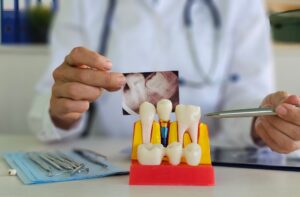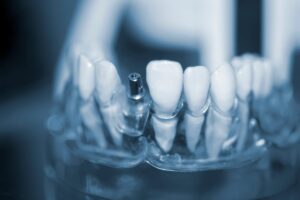After implant surgery, knowing what to expect helps speed healing and avoid complications. The recovery from dental implant often starts with soreness and swelling but usually improves quickly with the right home care. Follow instructions, rest, and watch for warning signs so you can heal safely and get back to normal tasks sooner.
The First 48–72 Hours: What to Expect
Expect some bleeding, swelling, bruising, and soreness in the first two to three days. Bite gently on gauze to control bleeding, use ice packs on the cheek (20 minutes on, 20 off), rest with your head elevated, and take prescribed meds as directed. Most symptoms peak around 48 hours and then slowly improve.
Pain Management And Medications
Over-the-counter vs. prescription
Start with ibuprofen or acetaminophen unless your dentist prescribes otherwise. Antibiotics may be given to prevent infection. Opioids are rarely needed; if prescribed, use the lowest dose for the shortest time and watch for side effects. Call the office if pain is uncontrolled after taking meds as directed.
Managing nausea and oral discomfort
Take medications with a small amount of food if they upset your stomach. Use topical oral gels for gum discomfort if recommended. Avoid rinsing hard, spitting, or touching the surgical site, which can delay healing or dislodge clots.
Daily Care: Oral Hygiene And Diet
Cleaning around the implant
Gently rinse with saline or a chlorhexidine rinse as directed, starting the day after surgery. Avoid brushing the surgical site for the first few days; resume gentle brushing around the area once your dentist says it’s safe, usually within a week.
Eating and drinking
Stick to soft foods like yogurt, applesauce, mashed potatoes, smoothies, and scrambled eggs for the first few days. Avoid hot foods and drinks, crunchy or hard items, and straws. Stay well hydrated—fluids support healing.
Activity, Sleep, And Lifestyle Factors That Affect Healing
Rest and avoid heavy lifting or intense exercise for several days. Sleep with your head elevated to reduce swelling. Do not smoke or drink alcohol while healing—both slow tissue repair and raise infection risk. These choices have a big impact on the speed and safety of your recovery.
Timeline For Recovery From Dental Implant
First week: most pain and swelling improve; continue soft diet. Weeks 2–8: gum tissue heals and stitches (if any) dissolve or are removed. Three to six months: osseointegration, when bone bonds to the implant, occurs—this is when final restorations are planned. Typical follow-ups are at one week, a few weeks, and periodic checks during the first months.
Warning Signs: When To Contact Your Dentist
Call your dentist or go to the ER for heavy bleeding that won’t stop, fever over 101°F, worsening or severe pain, pus or foul drainage, a loose implant, or signs of an allergic reaction. Quick action prevents problems from getting worse.
Practical Tips To Speed Recovery
Eat protein and vitamin-rich foods, use ice for the first 48 hours then warm compresses after, rinse gently with saltwater, and follow all medication instructions. Avoid smoking and supplements that thin blood (like high-dose fish oil or vitamin E) unless cleared by your dentist or physician. Keep all follow-up visits.
Why Advanced Training Matters For Faster, Safer Recovery
Experienced clinicians reduce complications and improve outcomes. Dr. Barrie Matthews, DMD, a University of Pennsylvania-trained dentist at Big Sky Smile Center, has advanced training in implants and anesthesia and continued education through Full Arch Masters and Implant Pathway. His skill and careful follow-up focus on patient comfort and safer recoveries.
Closing: Ready For A Smooth Recovery?
If you have questions about the recovery from dental implant process or want to schedule a consultation, call the office. Following post-op instructions and attending follow-ups are the best ways to ensure a fast, safe recovery and a successful long-term result.




